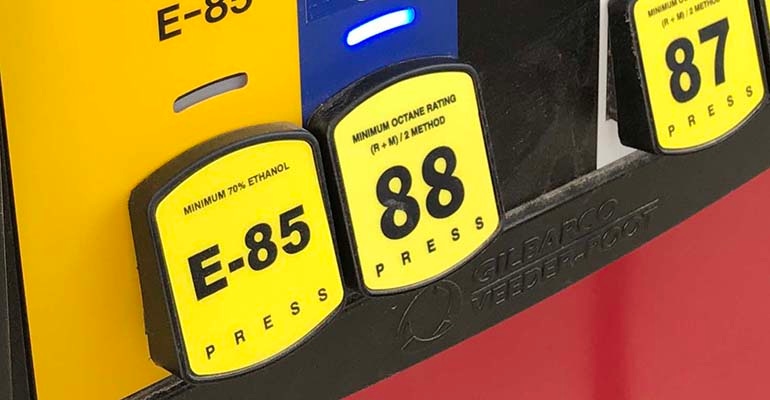
As regulatory attention turns to reducing emissions and low-carbon solutions, new bills introduced on Capitol Hill help position ethanol as another tool to help. Two new bills introduced in the Senate by Sen. Amy Klobuchar, D-Minn., and Sen. Joni Ernst, R-Iowa, would stimulate increased production of flex-fuel vehicles and expand retail infrastructure to enhance consumer access to lower-carbon fuel blends like E15 and E85. Another bill also offers biofuel tax credits for higher blends.
Growth Energy shares a nationwide transition to E15 could slash carbon emissions by 17.62 million tons per year – equal to removing approximately 3.85 million vehicles from the road. E15 is also a cheaper fuel averaging $0.05 to $0.10 cheaper per gallon when compared to regular gasoline.
“Higher ethanol blends continue to grow in popularity among drivers looking to save money while protecting our climate,” said Growth Energy CEO Emily Skor. “This legislative push offers a means to put higher biofuel blends within reach of drivers faster than ever, so we can make a greater difference for the climate today.”
The Clean Fuels Vehicle Act (S.2267) would encourage increased production and deployment of flex-fuel vehicles by creating a $200 refundable tax credit for each light-duty FFV manufactured for a period of 10 years. The legislation would also restore certain Corporate Average Fuel Economy credits that were previously available to automakers for producing FFVs.
FFVs are needed as more gas stations around the nation are providing greater access to higher blends of ethanol like E85, a low-carbon and low-cost fuel.
Co-led by Ernst, the Biofuel Infrastructure and Agricultural Product Market Expansion Act would expand the availability of low-carbon renewable fuels in the marketplace, resulting in cleaner air, lower fuel process, and rural economic vitality. This legislation would provide for federal investment in renewable fuel infrastructure like blender pumps and storage tanks, allowing small businesses across the nation to provide cleaner and more affordable options to American drivers.
Earlier this spring Klobuchar introduced the Renewable Fuel Infrastructure Investment and Market Expansion Act (S.2271), which would codify a $500 million grant program for the deployment of renewable fuel infrastructure and direct the U.S. Environmental Protection Agency to finalize proposed rules relating to requirements for E15 fuel dispenser labeling and underground storage tank compatibility.
Also, Klobuchar and Sen. John Thune, D-S.D., introduced a third bill related to biofuel tax credits for higher blends, the Low-Carbon Biofuel Credit Act (S.2262); Reps. Cindy Axne, D-Iowa, and Adrian Smith, R-Neb., introduced similar legislation in the House. The Low Carbon Biofuel Credit Act would create a tax credit for each gallon of fuel containing 15% or greater ethanol content. The bill would allow an ethanol blender or fuel retailer to claim a 5 cent tax credit for each gallon of E15 blended or sold and a 10 cent tax credit for each gallon greater than E15 blended or sold. This legislation would also allow the credit to be fully refundable and transferable for small retailers.
"Diversifying our fuel supply, introducing higher blends of biofuels to the market, and making sure retailers have the right equipment to take advantage of these blends will promote clean energy and support our rural economies,” says Klobuchar. “This biofuels infrastructure package will make cleaner fuels more accessible – ultimately benefiting both the economy and the environment.”
“Homegrown biofuels, especially higher octane blends like E15, offer readily available emissions reductions that are mistakenly being overlooked in the current energy debate,” says Thune. “Biofuels not only support a critical market for our farmers and deepen American energy security, but they offer a lower-carbon fuel for domestic use and export without the unresolved costs, labor issues, and resource constraints of the all-in push for vehicle electrification. This bill will help further expand consumer access to E15, building off the long-sought ability to sell the fuel year-round, which was secured in 2019.”
Building on this effort to diversify the use of renewable fuels in the automotive industry, the Clean Fuels Vehicle Act would incentivize the manufacture of Flex Fuel Vehicles capable of utilizing higher blends of clean fuels. The bill would create a $200 refundable tax credit for each FFV manufactured for the light duty vehicle market. The credit would be made available to Original Equipment Manufacturers and sunset after a period of 10 years.
This legislation is supported by the Minnesota Corn Growers Association, Renewable Fuels Association, Growth Energy, American Coalition for Ethanol, and POET.
“These bills recognize that American-made ethanol can and should play a central role in our nation’s efforts to quickly reduce greenhouse gas emissions from the transportation sector,” says Geoff Cooper, Renewable Fuels Association President and CEO. “Our nation cannot fully capitalize on ethanol’s low-carbon benefits unless more retail stations offer higher blends and more vehicles are produced that can run on flex fuels like E85. The legislation introduced today would help address both of those marketplace bottlenecks, while supporting rural communities across the heartland at the same time.”
Dave Ellens, vice president of the South Dakota Corn Growers Association, adds, “For too long, the oil industry has had a monopoly on what U.S. motorists put into their cars and trucks, which has limited choice, increased costs to consumers, and blocked cleaner fuels from the market. The Klobuchar-Thune bill is a step to level the playing field. The legislation’s incentives for gas stations to provide consumers with higher blends of ethanol like E15 is a timely signal about the role that ethanol can play, today, in decarbonizing the U.S. transportation sector.”
In February, Klobuchar and Thune introduced the Adopt GREET Act which would require the EPA to update its greenhouse gas modeling for ethanol and biodiesel. Klobuchar also led a letter with Sen. Chuck Grassley, R-Iowa, to the EPA highlighting the need to restore integrity to the RFS by reviewing small refinery waivers, swiftly issuing a proposed rule for the 2021 Renewable Volume Obligation, and advancing the proposed E15 streamlining proposal.
About the Author(s)
You May Also Like






